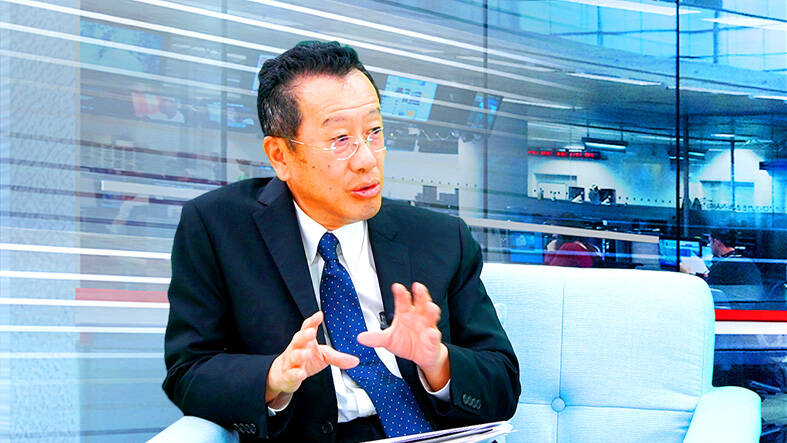This year’s Han Kuang military exercises will emphasize force preservation and homeland defense to stop the Chinese People’s Liberation Army (PLA) from crossing the Taiwan Strait, National Security Council Secretary-General Wellington Koo (顧立雄) said.
Koo made the remarks three days before the launch of the annual drills in an exclusive interview with the Chinese-language Liberty Times (the sister paper of the Taipei Times) that was posted online yesterday.
A key objective of this year’s exercise is to test the armed forces’ ability to survive a surprise attack by China with enough assets remaining to conduct counterstrikes, Koo said, adding that various methods would be used to gauge their effectiveness.

Photo: Chen Yun, Taipei Times
Another crucial aim of the drills is to boost homeland defense operations, including air defense and maritime joint interdiction capabilities, he said.
“Should we achieve these goals, we would able to prevent [the PLA] from crossing the Taiwan Strait,” Koo said.
The air force’s ability to persevere against enemy attacks and retain sufficient assets to contest Chinese air superiority would be an important aspect of the nation’s defense, he said.
The field exercises include repelling attacks by simulated Chinese airborne forces as the PLA’s preferred mode of attack appears to be helicopter-based air assaults instead of amphibious landings, Koo said.
“Defending Taiwan would not be a purely military endeavor, but also involve making use of civilian personnel and materiel,” Koo said, adding that this capability would be tested in the drills.
Asked about the sharp fall in the number of countries that recognize the nation’s sovereignty, Koo said Taiwan’s security depends on the international community’s recognition of the nation’s importance to the common good, not the number of diplomatic allies.
Taipei’s stance that Taiwan and China should not be subordinate to one another has gained traction in the international community in large part due to the understanding that Taiwan’s welfare is important to the common good, he said.
Despite Beijing’s claims, the world has rejected the position that the cross-strait situation is an internal issue and has come to recognize that changing the “status quo” by force or intimidation is utterly unacceptable, Koo said.

SECURITY: As China is ‘reshaping’ Hong Kong’s population, Taiwan must raise the eligibility threshold for applications from Hong Kongers, Chiu Chui-cheng said When Hong Kong and Macau citizens apply for residency in Taiwan, it would be under a new category that includes a “national security observation period,” Mainland Affairs Council (MAC) Minister Chiu Chui-cheng (邱垂正) said yesterday. President William Lai (賴清德) on March 13 announced 17 strategies to counter China’s aggression toward Taiwan, including incorporating national security considerations into the review process for residency applications from Hong Kong and Macau citizens. The situation in Hong Kong is constantly changing, Chiu said to media yesterday on the sidelines of the Taipei Technology Run hosted by the Taipei Neihu Technology Park Development Association. With

CARROT AND STICK: While unrelenting in its military threats, China attracted nearly 40,000 Taiwanese to over 400 business events last year Nearly 40,000 Taiwanese last year joined industry events in China, such as conferences and trade fairs, supported by the Chinese government, a study showed yesterday, as Beijing ramps up a charm offensive toward Taipei alongside military pressure. China has long taken a carrot-and-stick approach to Taiwan, threatening it with the prospect of military action while reaching out to those it believes are amenable to Beijing’s point of view. Taiwanese security officials are wary of what they see as Beijing’s influence campaigns to sway public opinion after Taipei and Beijing gradually resumed travel links halted by the COVID-19 pandemic, but the scale of

A US Marine Corps regiment equipped with Naval Strike Missiles (NSM) is set to participate in the upcoming Balikatan 25 exercise in the Luzon Strait, marking the system’s first-ever deployment in the Philippines. US and Philippine officials have separately confirmed that the Navy Marine Expeditionary Ship Interdiction System (NMESIS) — the mobile launch platform for the Naval Strike Missile — would take part in the joint exercise. The missiles are being deployed to “a strategic first island chain chokepoint” in the waters between Taiwan proper and the Philippines, US-based Naval News reported. “The Luzon Strait and Bashi Channel represent a critical access

Pope Francis is be laid to rest on Saturday after lying in state for three days in St Peter’s Basilica, where the faithful are expected to flock to pay their respects to history’s first Latin American pontiff. The cardinals met yesterday in the Vatican’s synod hall to chart the next steps before a conclave begins to choose Francis’ successor, as condolences poured in from around the world. According to current norms, the conclave must begin between May 5 and 10. The cardinals set the funeral for Saturday at 10am in St Peter’s Square, to be celebrated by the dean of the College